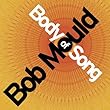 By Daniel Garrett
By Daniel Garrett
Bob Mould
Body of Song
Produced and mixed by Bob Mould
Yep Roc Records, 2005
Bob Mould’s lyrics mix supposedly personal admission and external references (metaphors, landmarks) but the loud, noisy rock music to which they are set is not itself intimate in “Circles,” which is followed by the short and optimistic lyric, dance beat, and rock guitar of “(Shine Your) Light Love Hope.” Bob Mould, formerly of Husker Du and Sugar, is here, on Body of Song, joined by bass guitarist David Barbe, drummers Brendan Canty and Matt Hammon, and cellist Amy Domingues. I find this collection of songs to be noteworthy as a report on what Mould has been involved with recently, but much of the recording seems more intent on concealing than revealing, containing a rhetoric of lyric and musical gestures that seem strategic rather than artistic. Bob Mould’s band Husker Du was important to independent and youth rock music. Bob Mould’s solo recording Workbook was one of my favorite recordings (in one of that album’s songs, “Brasilia Crossed with Trenton,” Mould sings, “When you live in the middle of nowhere, your imagination runs away and wild./ You make games, I make games that I play most once a day”); and, after Mould’s Workbook and Black Sheets of Rain, Mould’s subsequent work with the band Sugar was often punchy and good, but I find Body of Song to be a respectable disappointment.
Rock music is associated with cool temperaments and hot passions, with firm masculinity and anti-establishment ambivalence, with noise and with peace—with so many contradictory attitudes and states that it is no wonder musicians feel the need to pose before playing. That is not healthy. That is not independence. That is not cool—it is the effect of tyranny and deception. I hear such confusion from the first song, “Circles,” in which Bob Mould says, “I stuff all my thoughts and the feelings down/ I get so far down, I got too far gone.”
Bob Mould sings “So if I tried to make it right, and if I found my appetite,/ I’d eat away at all the pain I seem to bring to you,” and these lyrics from “Paralyzed,” as they expound the mixed emotions in a relationship, a common theme among the songs here, are original without being eloquent.
Following the aggressive pose—the dramatic declarations, and the noise—of the first three songs, the rhythms, sound effects, and even the intensity seem more skillfully handled in “I Am Vision, I Am Sound.” There is masculine directness in Mould’s chanting vocal, but still I wish that there were an organic—an emotional—reason for the loud volume: I wish that I could point to enthusiasm or rage as a cause. The only possible cause I can read in the lyrics is an unavailable idealism—however, not everyone longs for idealism: one has to identify the wanting self, and Mould has not done that. He is oddly impersonal.
The words in “Underneath Days” could be those spoken to a lover or a friend, but the expectations and frustrations seem more like what would occur with parents, the complaints are so comprehensive: “Never wanna let me go my own way./ Never wanna let me find out for myself./ You always stand above me, underneath days./ You never got out of my way when I say./ You never stand in your shadow./ Never stand anyway.”
There is a melody and a softly phrased vocal in “Always Tomorrow,” which again rehearses the kind of dissatisfaction one hears in the other songs: “Doesn’t matter how much I say/ Wouldn’t register anyway.” There is distance and lack of communication also in “Days of Rain,” which has a pleasant sound. The songs are a sonic reprieve from what has gone before, but then “Best Thing,” about a failed relationship, returns the listener to high volume. It is possible to hear Body of Song as a concept album, as a rumination on conflict and loneliness, but the album simply seems redundant.
(Years ago, in Workbook’s “Brasilia Crossed with Trenton,” Bob Mould sang, “I wish that I could tell my story/ to all the people that listened to my story long ago./ I knew that this would happen sooner or later,/ that I’d get disillusioned with it all,/ just throw my hands up to the sky and say,/ Oh Lord, what happened, what happened/ to make things run this way.”)
A nicely grave vocal—considerate, thoughtful—and one even approaching high notes—is part of “High Fidelity,” and it seems that the closer Bob Mould gets to traditional music—music of harmony and melody, of beauty—the more satisfying his work is.
“Missing You” is loud, and “Gauze of Friendship” is a lyric attempt at something more ambitious, more poetic, as it suggests a three-way relationship, but some of it remains too vague, and “Beating Heart the Prize” offers more optimism and frustration. I can hope only that Bob Mould finds personal happiness and that his future work is better.
About the reviewer: Daniel Garrett has written about music for AllAboutJazz.com, Hyphen, IdentityTheory.com, Option, and PopMatters.com, including commentary on Sade, the Afghan Whigs, Tupac Shakur, Kitchens of Distinction, Matthew Sweet, and Annie Lennox; and his commentaries on Lizz Wright, Leela James, Skye, Morrissey, Sinead O’Connor, B.B. King, Frank Sinatra, and Al Green have appeared on the web pages of The Compulsive Reader. Daniel Garrett has written also about art, books, business, film, and politics, and his work has appeared in The African, American Book Review, Art & Antiques, The Audubon Activist, Cinetext.Philo, Film International, Offscreen, Rain Taxi, The Review of Contemporary Fiction, and World Literature Today.